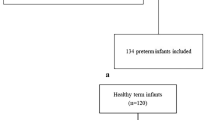Abstract
The time for passage of the first stool and urine was studied in 111 infants who weighed less than 1500 g at birth. Delayed passage of the first stool (greater than 24 h) was noted in 25 (22.5%) infants of this group, including 7 cases (6.3%) in whom the delay was greater than 48 h (4 on the 3rd day, 2 on the 4th day, 1 on the 6th day of life, respectively). Three (2.7%) cases had delayed passage of the first urine (at 25, 25, and 45 h of life, respectively). Significant differences between the two groups with delayed and nondelayed passage of the first stool were noted in both the gestational age and in the time of the first enteral feeding. In very low birth weight infants, delay in the passage of the first stool is a common occurrence. This delay is probably due to physiological immaturity of the motor mechanisms of the gut, and lack of triggering effect of enteral feeds on gut hormones. As far as passage of the first urine was concerned, there were no significant perinatal factors found between the delayed and nondelayed groups.
Similar content being viewed by others
Abbreviations
- NEC :
-
necrotizing enterocolitis
- RDS :
-
respiratory distress syndrome
- VLBW :
-
very low birth weight
References
Bodian M (1956) Clinical pathological conference. J Pediatr 48: 232–238
Bueno L, Ruchebusche Y (1979) Perinatal development of intestinal myoelectrical activity in dogs and sheep. Am J Physiol 237: E61–67
Chih TW, Teng RJ, Wang CS, Yau Tsou KI (1991) Time of the first urine and the first stool in Chinese newborns. Acta Paediatr Sin 32: 17–32
Clark DA (1977) Times of first void and first stool in 500 newborns. Pediatrics 60: 457–459
Jhaveri MK, Kumar SP (1987) Passage of the first stool in very low birth weight infants. Pediatrics 79: 1005–1007
Kramer I, Sherry SN (1957) The time of passage of the first stool and urine by the premature infant. J Pediatr 51: 373–376
McLain CR (1963) Amniography studies of the gastrointestinal motility of the human fetus. Am J Obstet Gynecol 86: 1079–1087
Milla PJ (1984) Development of intestinal structure and function in neonatal gastroenterology. In: Tanner MS, Stocks RJ (eds) Neonatal gastroenterology: contemporary issues. Scholium International, New York, pp 1–20
Sherry SN, Kramer I (1955) The time of passage of the first stool and urine by the newborn infant. J Pediatr 46: 158–159
Szurszewski JH (1969) A migrating electric complex of the canine small intestine. Am J Physiol 217: 1757–1763
Williams RM, Beck F (1969) A histochemical study of gut mutation. J Anat 105: 487–490
Yu VYH (1975) Effect of body position on gastric emptying in the neonate. Arch Dis Child 50: 500–504
Author information
Authors and Affiliations
Rights and permissions
About this article
Cite this article
Wang, PA., Huang, FY. Time of the first defaecation and urination in very low birth weight infants. Eur J Pediatr 153, 279–283 (1994). https://doi.org/10.1007/BF01954520
Received:
Accepted:
Issue Date:
DOI: https://doi.org/10.1007/BF01954520




